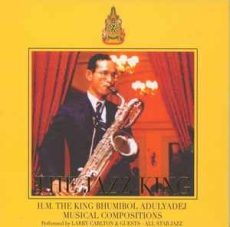
Daily Dose Of Jazz…
Bhumibol Adulyadej was born on December 5, 1927 in Cambridge, Massachusetts, however, the family moved to Bangkok, Thailand where she briefly attended Mater Dei school. In 1933 his mother took the family to Switzerland, where he continued his education at the École nouvelle de la Suisse romande in Lausanne. In 1934 he was given his first camera, which ignited his lifelong enthusiasm for photography.
Before he became King of Thailand, titled Rama IX, in 1942, Bhumibol became a jazz enthusiast, and started to play the saxophone, a passion that he kept throughout his life. He received his high-school diploma with a major in French literature, Latin, and Greek from the Gymnase Classique Cantonal de Lausanne, and by 1945 had begun studying sciences at the University of Lausanne, when World War II ended and the family was able to return to Thailand.
Adulyadej became an accomplished jazz baritone saxophone player and composer, playing Dixieland and New Orleans jazz. He also played the clarinet, trumpet, guitar, and piano. It is widely believed that his father may have inspired his passion for artistic pursuits at an early age. Initially focusing on classical music exclusively for two years but eventually switched to jazz since it allowed him to improvise more freely. It was during this time that he decided to specialize in wind instruments, especially the saxophone and clarinet. By 18 he started composing his own music with the first being Candlelight Blues.
He continued to compose even during his reign following his coronation in 1946. Bhumibol performed with Preservation Hall Jazz Band, Benny Goodman, Stan Getz, Lionel Hampton, and Benny Carter. Throughout his life, Bhumibol wrote a total of 49 compositions, much of it is jazz swing but he also composed marches, waltzes, and Thai patriotic songs.
He initially received general music training privately while he was studying in Switzerland, but his older brother, then King Ananda Mahidol, who had bought a saxophone, sent Bhumibol in his place. King Ananda would later join him on the clarinet. On his permanent return to Thailand in 1950, he started a jazz band, Lay Kram, whom he performed with on a radio station he started at his palace. The band grew, being renamed the Au Sau Wan Suk Band and he performed with them live on Friday evenings, occasionally taking telephoned requests.
Many bands such as Les Brown and His Band of Renown, Claude Bolling Big Band, and Preservation Hall Jazz Band recorded some of his compositions and can still be heard in Thailand. A 1996 documentary, Gitarajan, was made about his music. Adulyadej still played music with his Au Sau Wan Suk Band in later years, but was rarely heard in public. In 1964, Bhumibol became the 23rd person to receive the Certificate of Bestowal of Honorary Membership on behalf of Vienna’s University of Music and Performing Arts.
Baritone saxophonist, clarinetist, trumpeter, guitarist, pianist and composer and King Bhumibol Adulyadej, who reigned for 70 years and 126 days and is the longest of any Thai monarch, died on October 13, 2016 in Bangkok, Thailand.
More Posts: bandleader,clarinet,composer,guitar,history,instrumental,jazz,music,piano,saxophone,trumpet
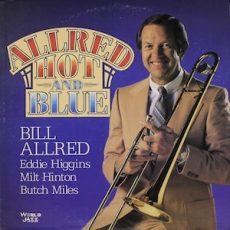
Daily Dose Of Jazz…
Bill Allred was born in Rock Island, Illinois on November 19, 1936 into a family where his father played the Streckfus Steamboat lines on the Mississippi.
He formed a Dixieland band while still in high school. In 1954 he enlisted in the Navy, playing with Navy bands throughout his tour and was excited to be part of a big band for the first time. Returning home he married, pursued a regular career and continued to gig.
His big break came in 1970 when, out of 2500 auditioning musicians, he was chosen to be part of the Disney World Band on the park’s opening day in 1970. While at Disney he formed a trad band called The Reedy Creek Jazz Band. The band was noticed by Bob Snow, who recruited him to put together a show and band for the Rosie O’Grady’s Goodtime Jazz Emporium, that ran for 25 years.
In 1979, Bill formed the Continental Jazz Band for a Roaring Twenties club in Fort Lauderdale, Florida. “Auntie Mame’s” later won the Carbonell Award for Best Cabaret Show in South Florida.
Trombonist and bandleader Bill Allred, who was a vital component of the classic jazz scene in South Florida, died on February 1, 2024 at the age of 87.
More Posts: bandleader,history,instrumental,jazz,music,trombone
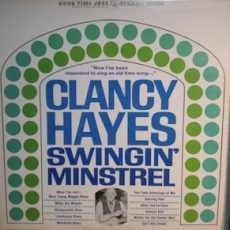
Daily Dose Of Jazz…
Clancy Hayes was born Clarence Leonard Hayes on November 14, 1908 in Caney, Kansas. As a child he learned the drums before switching to guitar and banjo.
Being part of a vaudeville troupe in the Midwest after 1923, Hayes lived in San Francisco from 1927. He became more popular in the 1930s through radio and club performances. From 1938 to 1940 he played in a big band led by Lu Watters, after which he spent a decade with the Yerba Buena Jazz Band, playing rhythm banjo and, on occasion, drums.
Spending almost all of the 1950s singing with Bob Scobey’s band, in the 1960s he led his own bands, which also recorded for various labels. Hayes played with the Firehouse Five Plus Two, Turk Murphy, and a group that evolved into the World’s Greatest Jazz Band. As a vocalist he was noted for his straightforward singing of ballads and his flamboyant delivery of livelier songs.
Banjoist and vocalist Clancy Hayes, who recorded eleven albums as a leader and six with Bob Scobey, died in San Francisco, California on March 13, 1972.
More Posts: bandleader,banjo,history,instrumental,jazz,music,vocal
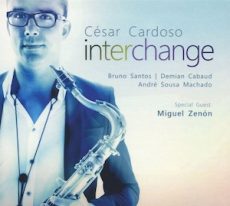
Daily Dose Of Jazz…
César Cardoso was born on November 10, 1982, in Leiria, Portugal. At only seven years old he dedicated his time to studying music, From 2004 to 2008 he studied at Hot Clube de Portugal’s Jazz School, where he had lessons with Jorge Reis and Pedro Moreira and started to distinguish himself as a jazz musician. 2008 had him enrolled at Escola Superior de Música de Lisboa, where he continued to work with Jorge Reis and Pedro Moreira. Completing a Jazz Bachelor Degree in saxophone performance, he became a member of the dixieland group Desbundixie with whom he recorded Kick’n Blow in 2007 and Up 2 Nine in 2009.
In 2010, César recorded his debut, Half Step, with his quintet at that timefollowed with a second album, Bottom Shelf, was released five years later in Hot Clube de Portugal, and features his original music this time written for His third album Interchange, was recorded with special guest, Miguel Zenón on alto saxophone.his quartet. His fourth album, Deice of Tenors, is a large ensemble recording.
He published the book Teoria do Jazz (Jazz Theory), with Chiado Editora, the first book ever written in Portuguese about the theoretical bases of Jazz, thought through to serve as a handbook for jazz students. His second book, a complement of the first, is titled Teoria do Jazz – Exercícios. Cardoso has composed and arranged for big bands, such as the Orquestra Jazz de Leiria and the Orquestra do Hot Clube de Portugal.
Saxophonist César Cardoso has won awards, became the first Portuguese musician to become an Artist Henri Selmer Paris, completed his PhD in Music and Musicology, and continues to perform, compose, arrange and teach at the Universidade de Évora in the Jazz degree program and is the pedagogical director of Escola de Jazz de Leiria.
More Posts: bandleader,history,instrumental,jazz,music,saxophone
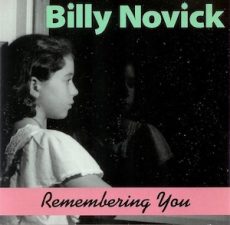
Daily Dose Of Jazz…
Billy Novick was born on Long Island, New York on October 12, 1951 and began playing clarinet at age eight. He picked up the saxophone at fifteen, and began playing club dates and concerts around the New York area. By 1973 he joined the David Bromberg band. After leaving the band, he started touring and making regional appearances as a sideman with a series of pop performers, including Leon Redbone, Jonathan Edwards, and Martha and the Vandellas.
While rehearsing for a dance performance in 1976, Novick was introduced to the innovative guitarist Guy Van Duser, and the two began a collaboration that continues to flourish. He joined the New Black Eagle Jazz Band, and continues to perform with them. He has appeared on more than thirty-five of the band’s recordings.
With jazz as his first love, Billy has always had an eclectic sensibility and enjoys being able to play a wide range of musical styles. He has performed with blues greats Robert Junior Lockwood, Willie Dixon, Ruth Brown, Duke Robillard, Scott Hamilton, Milt Hinton, Herb Pomeroy, Dave McKenna, Dorothy Donegan and Butch Thompson. He has recorded with a wide variety of artists including Maria Muldaur, Tex-Mex star Freddy Fender, Celtic performers Robbie O’Connel and Aine Minogue, and even rock legend J. Geils.
Internationally recognized as a musician, performer, arranger and composer, he has toured extensively throughout North America, Europe and Asia, and has made spotlight appearances at numerous festivals.
Clarinetist Billy Novick, who has been featured as a sideman on over two hundred and fifty recordings and as a composer, arranger or studio musician has appeared in more than 100 film scores, television shows and commercials, continues to compose, arrange, perform and record.
More Posts: clarinet,history,instrumental,jazz,music




